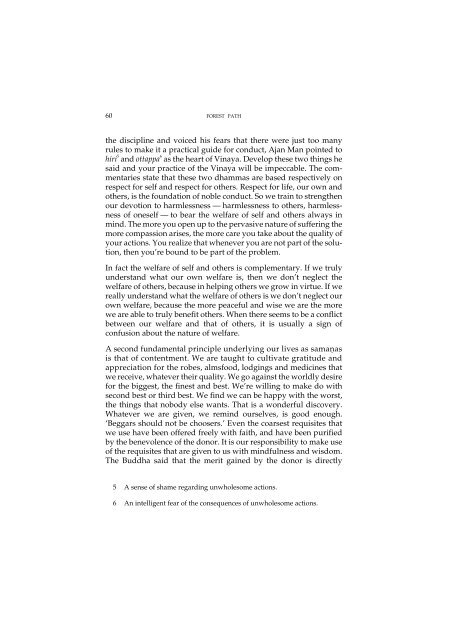Forest Path - Amaravati Buddhist Monastery
Forest Path - Amaravati Buddhist Monastery
Forest Path - Amaravati Buddhist Monastery
Create successful ePaper yourself
Turn your PDF publications into a flip-book with our unique Google optimized e-Paper software.
60 forest path<br />
the discipline and voiced his fears that there were just too many<br />
rules to make it a practical guide for conduct, Ajan Man pointed to<br />
hiri 5 and ottappa 6 as the heart of Vinaya. Develop these two things he<br />
said and your practice of the Vinaya will be impeccable. The commentaries<br />
state that these two dhammas are based respectively on<br />
respect for self and respect for others. Respect for life, our own and<br />
others, is the foundation of noble conduct. So we train to strengthen<br />
our devotion to harmlessness — harmlessness to others, harmlessness<br />
of oneself — to bear the welfare of self and others always in<br />
mind. The more you open up to the pervasive nature of suffering the<br />
more compassion arises, the more care you take about the quality of<br />
your actions. You realize that whenever you are not part of the solution,<br />
then you’re bound to be part of the problem.<br />
In fact the welfare of self and others is complementary. If we truly<br />
understand what our own welfare is, then we don’t neglect the<br />
welfare of others, because in helping others we grow in virtue. If we<br />
really understand what the welfare of others is we don’t neglect our<br />
own welfare, because the more peaceful and wise we are the more<br />
we are able to truly benefit others. When there seems to be a conflict<br />
between our welfare and that of others, it is usually a sign of<br />
confusion about the nature of welfare.<br />
A second fundamental principle underlying our lives as samaõas<br />
is that of contentment. We are taught to cultivate gratitude and<br />
appreciation for the robes, almsfood, lodgings and medicines that<br />
we receive, whatever their quality. We go against the worldly desire<br />
for the biggest, the finest and best. We’re willing to make do with<br />
second best or third best. We find we can be happy with the worst,<br />
the things that nobody else wants. That is a wonderful discovery.<br />
Whatever we are given, we remind ourselves, is good enough.<br />
‘Beggars should not be choosers.’ Even the coarsest requisites that<br />
we use have been offered freely with faith, and have been purified<br />
by the benevolence of the donor. It is our responsibility to make use<br />
of the requisites that are given to us with mindfulness and wisdom.<br />
The Buddha said that the merit gained by the donor is directly<br />
5 A sense of shame regarding unwholesome actions.<br />
6 An intelligent fear of the consequences of unwholesome actions.

















